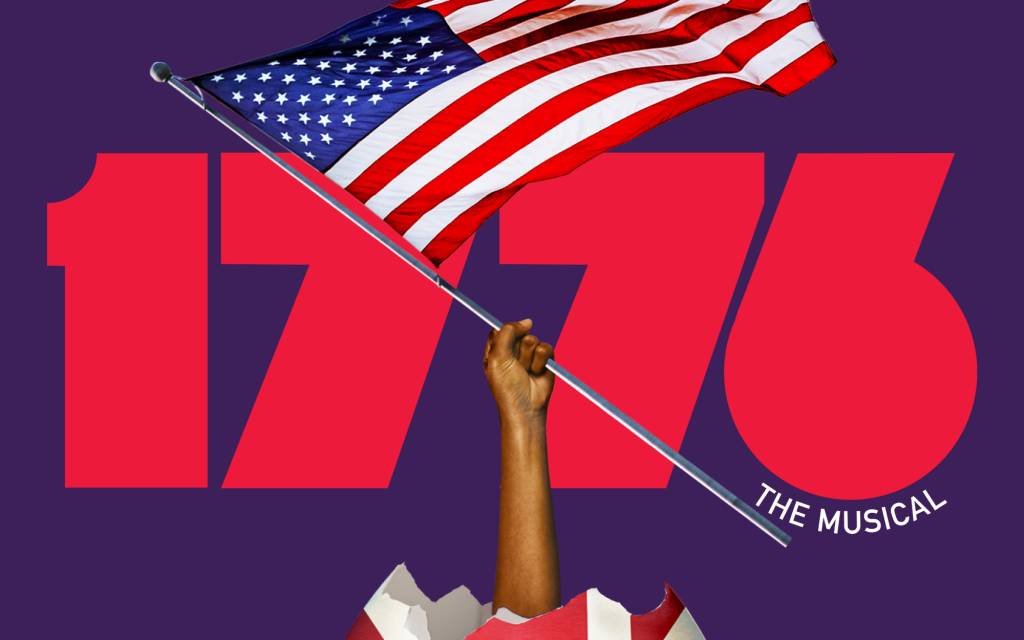Damn.
That was the only word that resounded in my mind upon leaving the new production of 1776, playing not at the American Repertory Theater in Cambridge. Damn, that was transformative. Damn, that was perfectly tuned into our American moment. Damn, America has a lot of work do.
Directors Jeffrey L. Page and Diane Paulus have altered the premise of this 1969 musical to see women, trans, and non-binary performers step into the shoes of the Founding Fathers, as they make deals and debate whether they should openly declare independence from King George. We all know how the story ends, though I doubt anyone has thought about it in the exact way it is presented here.
John Adams is the major figure, working to get Richard Henry Lee (Shawna Hamic) to suggest a resolution of independence to Congress and subsequently deputizing Thomas Jefferson (a quiet Elizabeth A. Davis) to draft the Declaration of Independence. Played with passion by Crystal Lucas-Perry, he – or, maybe, she – makes for a compelling protagonist for the entire American project. Working closely with Benjamin Franklin – the show’s unguarded heart, largely thanks to Patrena Murray’s vivacious performance – she will stop at nothing to break free from the tyranny of British rule, eager to bring the rest of the colonies with her. As her fellow compatriots counter her points, she begins to wonder if anyone sees the need for freedom as she does.
The loudest voice of opposition comes from Joanna Glushak’s John Dickinson of Pennsylvania, who has broadly aligned herself, with a block of Southern states that are wary of the desire of the New Englanders to break free from the British Empire. Long debates about freedom gobble up nearly half of the first act, where nearly every representative gets a chance to weigh in with their unique opinion, but despite the complex argumentation, it’s some of the most engaging and well-constructed argumentation I’ve seen on stage. It’s a great help that the uniformly terrific cast brings a distinct air to their character, differentiating people that could very easily run together.
The central question that undergirds everything about this production concerns the purpose of declaring freedom in the first place. How will the country rule itself? The Southern colonies want to maintain their own sovereignty, without overarching rule from the North. The North needs to South to join them in the fight for freedom. The conflict comes to a head when Jefferson’s Declaration of Independence makes a reference to slavery as an inherently evil institution, and there’s a very real possibility that the Southern states will not align with the North. In the production’s most impactful number (a true testament, as the second act contains at least four numbers that pack a wallop), Edward Rutledge of South Carolina (Sara Porkalob, impeccable) announces that the New England states cannot rest firmly on their “disdain” for slavery, because they still participate in the trading of slaves. The next five or so minutes, during a song entitled “Molasses to Rum,” are so unnerving, I felt compelled to abstain from applause. It holds the North – which ran the slave trade – just as accountable for slavery as the South, recontextualizing our support for the Northern leaders. The superiority that the North holds over the South, driving most of the divide between the two, is proven to be entirely false – the whole colonial project is held together by the same participation in slavery.
The strength of that number speaks to the innovation of the production to invest in its non-traditional casting beyond merely putting the words in new mouths (though there’s a power to that as well). The diverse cast, which sees performers across a range of races, gender identities, and body types, steps outside of the action whenever the script makes references to the frustrating implications of the characters’ language. As Thomas Jefferson reads his famous “all men are created equal line,” the Black woman playing his slave bristles and stops what she was doing. Benjamin Franklin’s call to endow all people with rights over their own bodies stings on multiple levels, especially in the wake of the Supreme Court’s decision to strip women of their right to make decision about their own bodies. This is a show that is convinced that America has made horrific concessions to remain united and to have a chance at survival, but nonetheless urges us to stand with power and humility, to dare to ask if anyone see what we see and move to enact a plan to change it.
I will not be able to get the transcendent final image of this production out of my head – as a bell rings and the glorious orchestration underscores the reading of names signed to the Declaration of Independence, the cast begins to disrobe from their 1770’s get-up, stripping back down to their standard, plain attire of today. Behind them, the barrels of molasses and rum – the stand-in symbols for the horrific proliferation of slavery – loom large and tall. It’s imposing and terrifying, and the performers know it. They look scared, stripped of their power, scared about the future that awaits them. Scared, because they know their decisions will matter far into the future.
Most importantly, they’re begging us to do things differently.
Thank you, 1776.
